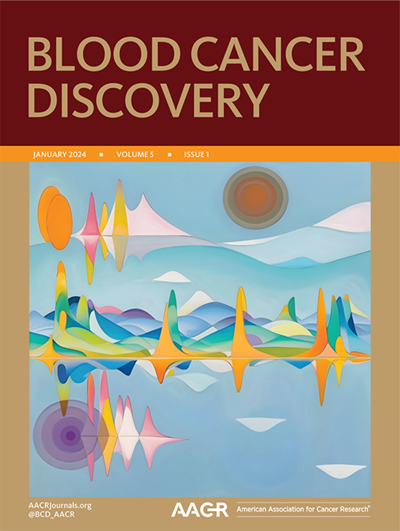High-Dose Methotrexate, Ibrutinib, and Temozolomide in the Treatment of Newly Diagnosed Primary CNS Lymphoma: A Multicenter, Prospective Phase II Study.
IF 11.5
Q1 HEMATOLOGY
引用次数: 0
Abstract
Significance: We report promising efficacy and good tolerability of Bruton tyrosine kinase (BTK) inhibitor ibrutinib in treatment of newly diagnosed PCNSL. Additionally, we explored the contribution of ctDNA profiling to predictive potential in this prospective study. The consistency of ctDNA clearance from CSF/plasma was associated with more sustained treatment response and survival.
大剂量甲氨蝶呤、依鲁替尼和替莫唑胺治疗新诊断的原发性中枢神经系统淋巴瘤:一项多中心、前瞻性ii期研究
慢性活性b细胞受体信号的遗传改变常发生在原发性中枢神经系统淋巴瘤(PCNSL)。我们进行了一项高剂量甲氨蝶呤联合依鲁替尼和替莫唑胺(MIT)治疗新诊断的PCNSL的ii期试验。共纳入35例患者,其中33例纳入分析。诱导治疗的最佳总有效率为93.9%,完全有效率为72.7%。2年无进展生存期(PFS)和总生存期分别为57.6% (95%CI: 49.0 ~ 66.2)和84.8% (95%CI: 78.6 ~ 91.0)。≧3级不良事件发生率为27.3%(10/33)。在基线时肿瘤和脑脊液样本的靶向测序检测的475个基因中,PIM1、MYD88、BTG2和CD79B的突变最为常见。观察脑脊液/血浆ctDNA清除的一致性和成像的完全反应。两个周期后ctDNA从CSF中清除的患者获得了更长的PFS (p = 0.044)。
本文章由计算机程序翻译,如有差异,请以英文原文为准。
求助全文
约1分钟内获得全文
求助全文
来源期刊

Blood Cancer Discovery
Multiple-
CiteScore
12.70
自引率
1.80%
发文量
139
期刊介绍:
The journal Blood Cancer Discovery publishes high-quality Research Articles and Briefs that focus on major advances in basic, translational, and clinical research of leukemia, lymphoma, myeloma, and associated diseases. The topics covered include molecular and cellular features of pathogenesis, therapy response and relapse, transcriptional circuits, stem cells, differentiation, microenvironment, metabolism, immunity, mutagenesis, and clonal evolution. These subjects are investigated in both animal disease models and high-dimensional clinical data landscapes.
The journal also welcomes submissions on new pharmacological, biological, and living cell therapies, as well as new diagnostic tools. They are interested in prognostic, diagnostic, and pharmacodynamic biomarkers, and computational and machine learning approaches to personalized medicine. The scope of submissions ranges from preclinical proof of concept to clinical trials and real-world evidence.
Blood Cancer Discovery serves as a forum for diverse ideas that shape future research directions in hematooncology. In addition to Research Articles and Briefs, the journal also publishes Reviews, Perspectives, and Commentaries on topics of broad interest in the field.
 求助内容:
求助内容: 应助结果提醒方式:
应助结果提醒方式:


